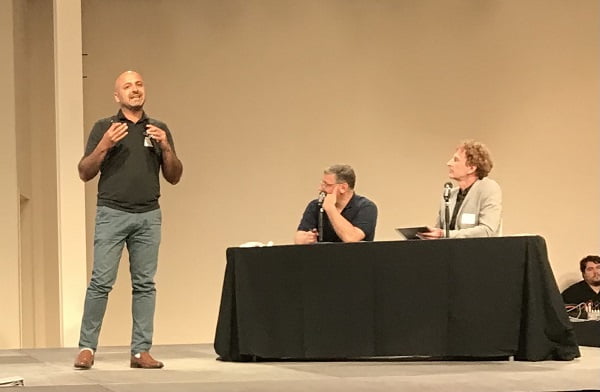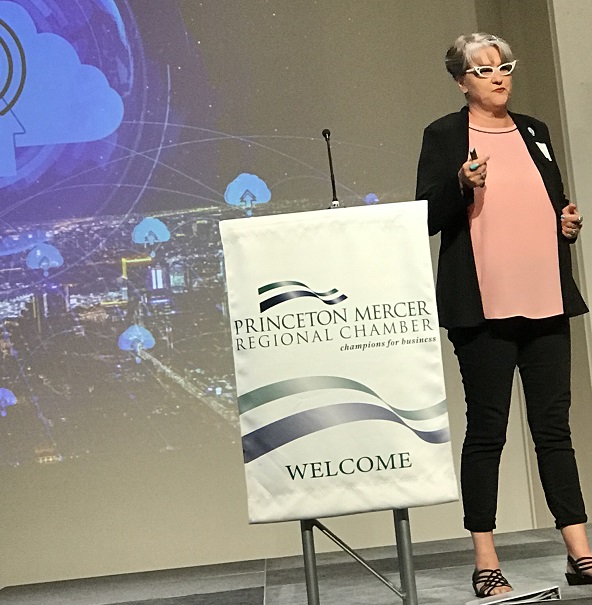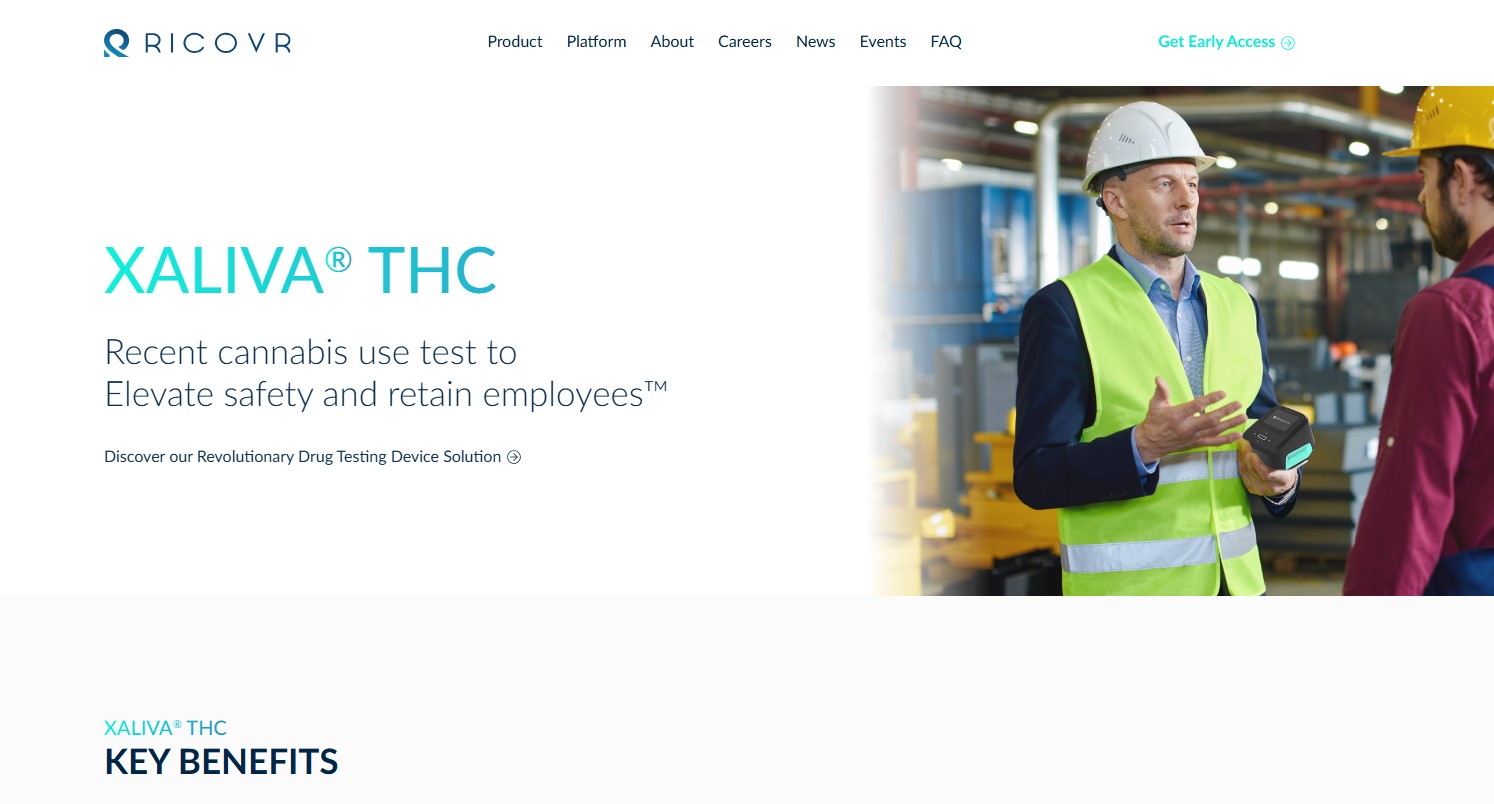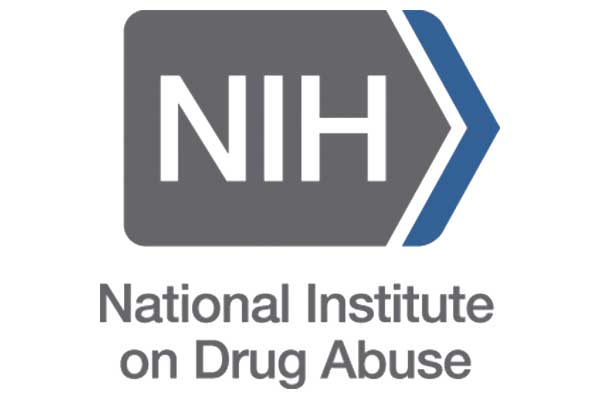Princeton Startups Pitch to Two Princeton-Based Investors

Ricovr Healthcare is one of three Princeton area startups pitching to venture capitalists (VCs) in the latest “Princeton Pitch Stop.”
This month, venture capitalists and bankers, mostly without masks, convened at Grounds for Sculpture (Hamilton) to listen to three startups pitch their businesses.
“Tonight, it is all about the money,” said Hal English, president and CEO of the Princeton Mercer Regional Chamber, which hosted the event.
“There are venture capitalists looking to invest, and there are bankers in this room looking to invest. The economy is coming back quicker than anybody can imagine.”
English added that the Princeton Pitch Stop event had been cancelled in March 2020 because of the pandemic. But at this event, on July 13, “everybody was excited to be back. Everybody was smiling. … It felt like a high school reunion.”
Investors’ Comments
This time, a panel of two experts listened to the pitches. They shared English’s optimism, but advised the audience to look beyond any period of uncertainty that may occur first.
“We’re in an unprecedented time right now in terms of markets,” said Sean O’Sullivan, managing general partner at Princeton-headquartered SOSV, and one of the panelists.
The market is “very overheated, almost irrational in terms of valuations. There is a lot of uncertainty about the valuations of stocks going forward, making it hard to act. But, you know, if you look from the viewpoint of a venture capitalist, you’re looking for megatrends that will change the world in such profound ways that we’re going to create trillions of dollars worth of new economy in the coming years. That possibility makes acting easier, even in today’s market.”
O’Sullivan added, “SOSV invests around $80 million to $100 million a year into new startups, up to 120 new startups per year. The people who invest alongside us in those companies invest another $1.3 billion per year.
“So, there’s a lot of leverage there from the people who are looking to create this new world of possibilities. We must, I think, be willing to look behind the uncertainty of the moment and at what will happen in 10 years.
“I remember just six years ago, we invested in this company that made milk without cows. People laughed at us for thinking you can make milk without cows. Today, it’s not widely available yet, except in ice cream form, and it’ll take another six or seven years for the first billion people to use it, but it’s one of those changes that is unstoppable. We must recognize that animal agriculture is very dangerous for the world that we live in, with climate change and other global issues,” he said.
“We also invested in meat without animals, fish without oceans, and all sorts of other technologies that are just now starting to boom. In 20 years, it’ll be very unusual for people to eat meat grown by an animal with a brain attached to it. And this all sounds like crazy talk, but I assure you, it’s possible and, in fact, inevitable,” he said.
“The world is advancing at a very rapid pace, following certain unstoppable trends, and we are going to have to embrace change, as we always do because the status quo would otherwise kill us.”
The other panelist, Dan Herscovici, a Edison Partners (Princeton) partner, noted that his firm invests in later-stage growth companies.
“These are companies with $7 million to $15 million in revenue and accelerating. They are more mature product-wise and have a proven product/market fit. We are investing $10 million to $20 million into these companies as minority growth investors,” he said.
“We saw deals this past year remain strong, and the market overall is very strong,” he added.
Bag-A-Burger
The Daab father-and-son team hoped their pitch for Bag-A-Burger (West Windsor) would capture some attention from the plant-based vegan burger company.
“We are looking for $250,000 for 10 percent of our revolutionary new veggie burger company,” said the son, Jackson Daab.
The alternative meat market contains unhealthy ingredients, such as saturated fat, chemicals, and even “methyl cellulose.’ That is a laxative.” Plus, those products need to be kept frozen.
Daabs’ product does not contain preservatives or artificial ingredients, requires no refrigeration, is gluten-free, and is low in salt and fat.
The father, Erik Daab, was contacted by David Ur, a fellow graduate of West Windsor-Plainsboro High School, class of 1988. Mr. Ur is now a professional chef in Los Angeles, and he had devised the idea for a veggie burger.
They began the business in 2019. “Marketing became our biggest issue. We were spending way more on advertising on Amazon than we were making. We immediately went out to stores. They immediately picked us up. They were interested, and we sold on our website and advertised through Instagram and Facebook. Then, unfortunately, COVID hit,” Erik Daab said.
“So, we had to rely exclusively on Amazon and Walmart.com, and, unfortunately, we simply did not have the money to advertise. So, we sold approximately 1,000 units from November of 2019 to today.”
With marketing funds, “we hope to turn this into a billion-dollar company,” Jackson Daab said.
RICOVR Healthcare
Himanshu Bhatia made the pitch for RICOVR Healthcare (Princeton), showcasing its portable, saliva-based, rapid-result testing device. This device focuses on THC detection but could also be used for COVID testing.
“There is a great need to test for the presence of disease, drugs, and other markers, but there is a great need for accuracy and reliability,” said Bhatia, founder and CEO of RICOVR.
The product uses saliva to test for the presence of markers. He said that saliva is one of the best noninvasive means of discovering the presence of many analytes. There has been a great interest in this kind of saliva testing, but the earlier technologies proved to be inadequate, he said.
“Our platform solves those problems. It is very simple to use. The user is given a swab, and a very small drop of saliva is collected and dispensed into a tube containing our proprietary nanoparticle mix. The machine is turned on, and a disposable cartridge is added, followed by inserting the tube. In a few minutes, a result is displayed on the device,” he said.
“We started with our initial use case for marijuana testing, as we all know marijuana is here to stay, and businesses are facing several problems with employees,” he said.
“With our device, we can detect THC at multiple folds [concentrations] better than the leading competitor and five times faster. We are detecting marijuana at a very accurate level.
“The technology is capable of doing much more,” Bhatia said, noting its potential for COVID testing, for which the results have been extremely promising. RICOVR was awarded a prestigious Indo-U.S. Science and Technology Forum award for its work on COVID.
He said interest in RICOVR has been “huge,” including inquiries from a notable insurance company, leading medical distributors, and construction companies. He said the company plans to launch by December. RICOVR has raised over $3 million from investors in Silicon Valley and elsewhere.
VictimsVoice
Sheri Kurdakul, founder and CEO of VictimsVoice (Princeton), explained how her app helps victims of all forms of abuse to document information in a legally permissible way.
Kurdakul, who said she was a survivor of 29 years of abuse, sexual assault, and domestic violence, noted, “In those years of experience as a survivor, I have also been through criminal, civil, and family court. Victims are told every single day by folks in law enforcement that you’ve got to document everything, but they don’t tell you what to document or how that information will be used.”
What victims lack is the legal understanding of what constitutes admissible evidence. This results in eight out of 10 reported cases being dismissed and less than 2 percent of abusers being prosecuted. And most of those prosecutions are plea-bargained down to misdemeanor charges, she said.
“Victims who do make it to court face attacks from aggressive defense attorneys. These crimes happen behind closed doors, involve one person’s word against another, and are extremely difficult to prove. They often result in a lifetime of intimidation for the victim,” she said.
“VictimsVoice is a legally admissible documentation tool where victims can easily collect the necessary details of every incident of their abuse and store it in one central location so they can get better protections, seek legal justice, and assist prosecutions in building stronger cases and more appropriate charges for a victim,” she added.
“We take a traumatic event and break it down into easy-to-understand questions that are evidence-based, ensuring that nothing is forgotten or missed. Our progressive web app ensures that anyone can access this tool from any device anytime, anywhere.”
VictimsVoice simplifies complex processes for the user while complying with U.S. federal health and privacy laws and data privacy regulations. Having all the evidence collected and referenced in one tool, as part of a first-person account, will provide measurable results, including lower costs associated with investigator time and resources; a greater likelihood of favorable prosecution outcomes, such as stronger charges or more appropriate charges; greater access to grant funding for nonprofits serving victims; and increased community trust, as residents know that evidence won’t be lost in the red tape of outdated and often biased systems, Kurdakul said.
She added, “We’re categorizing the types of abuse and related crimes, and we’re able to provide data in almost real-time.”
Source: njtechweekly.com





